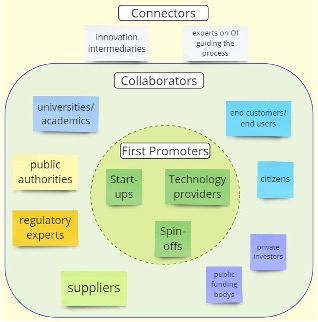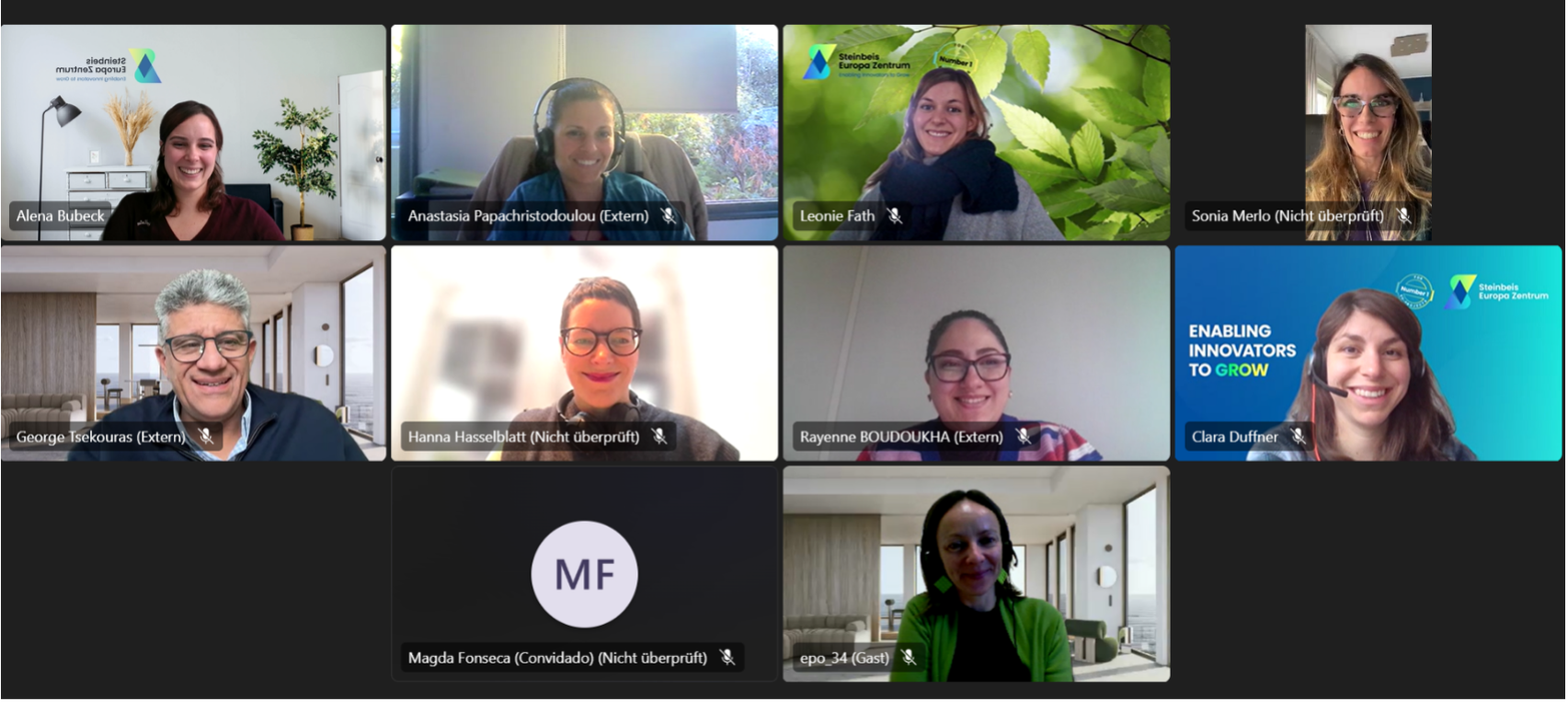November 19, 2024
The SHIFT-HUB project, funded by the European Union, hosted an engaging online Capacity Building Workshop titled “Driving Innovation – Effective Strategies for Open Innovation Workshops” on November 19, 2024. The event aimed to enhance participants’ capacity and knowledge by exploring effective methodologies and best practices for implementing Open Innovation (OI).
This workshop featured three diverse and successful examples of Open Innovation methodologies from different ecosystems—Smart Health, Social and Technological Innovation, and the perspective of small and medium-sized enterprises (SMEs). The event concluded with an interactive group session that encouraged participants to share experiences and insights.
Key Highlights
Speakers and Presentations:
The workshop was moderated by Dr. Alena Bubeck, Coordinator of the SHIFT-HUB project and project manager at Steinbeis Europa Zentrum. She introduced SHIFT-HUB’s objectives, before welcoming the following distinguished speakers:
- Anastasia Papachristodoulou, Business and Innovation Consultant at KiNNO Ltd and Work Package Leader in SHIFT-HUB, presented:
“The significance of Open Innovation” and “Open Innovation in Smart Health: Insights
from the SHIFT-HUB project.”
- Clara Duffner, Coordinator of the POSITIVE EU Project and Project Manager at Steinbeis Europa Zentrum, presented:
“Open Innovation in Social and Technological Innovation Ecosystems: Focus on Social Innovation Training Tools.”
- George Tsekouras, Coordinator of the INSPIRE Project and Innovation Chair at the British Academy of Management, presented:
“INSPIRE Methodology: Open Innovation (OI) from the Perspective of SMEs.”
Summary of the key note presentations:
- The significance of Open Innovation
Open innovation is crucial because it fosters collaboration, leveraging both external and internal ideas, technologies, and resources to accelerate innovation, enhance competitiveness, and tackle complex challenges effectively. It is a dynamic, interactive process that incorporates continuous feedback loops throughout the entire open innovation journey. This approach not only increases the likelihood of successfully bringing ideas and technologies to market but also facilitates expansion into new markets and business opportunities.
- SHIFT-HUB: Open Innovation in Smart Health: Insights from the SHIFT-HUB project.
The SHIFT-HUB EU project aims to establish a smart health innovation and a future technologies hub dedicated to advancing smart health solutions across Europe. Its primary goal is to facilitate the development, promote adoption, and drive the uptake of innovative smart health technologies and services. The SHIFT-HUB Service Offer follows a holistic approach, encompassing a wide range of activities and services, including Open Innovation (OI) Workshops designed to address the sector’s most pressing challenges. These workshops serve as a collaborative platform, bringing together diverse stakeholders from the quadruple helix—academia, industry, government, and civil society—to co-design and co-develop impactful solutions. By engaging stakeholders in the SHIFT-HUB service chain, the project fosters active participation and strengthens the smart health ecosystem across Europe.
- POSITIVE: Open Innovation in Social and Technological Innovation Ecosystems: Focus on Social Innovation Training Tools
The POSITIVE project aims at interlinking the technological and social innovation ecosystems through training, networking, and OI methods. The core of the project was the adapted Open Innovation Challenge, bringing together social entrepreneurs and tech students to develop solutions in product and service development. The POSITIVE Impact Challenges, organised in Germany, Italy, and Lithuania, not only offered new ideas and solutions for social entrepreneurs but also increased the participants knowledge and interest in open innovation methodologies and the students’ awareness on societal issues and their ability to make a difference. The POSITIVE project has compiled its findings and insights into an important resource entitled “The POSITIVE Impact Challenge Playbook – A tool to support Digital Innovation in Social Businesses”. This publication serves as a comprehensive guide to drive digital innovation and support growth in social enterprises.
- INSPIRE: INSPIRE Methodology: Open Innovation (OI) from the Perspective of SMEs
The INSPIRE methodology empowers SMEs to leverage open innovation for business growth. With tools, KPIs, and over 100 real-world SME case studies, INSPIRE supports the entire innovation journey—from ideation to market launch—through strategic partnerships and actionable frameworks. It comprises a variety of components, including tailored workshops, personalised coaching, the development of actionable plans, and opportunities to showcase open innovation progress through the INSPIRE Clinic. Complementing this, the INSPIRE webplatform serves as a comprehensive resource, streamlining the open innovation process. It offers an efficient and effective way to manage the various stages of open innovation, addressing challenges and ensuring success at every step.
Interactive Group Sessions
The interactive session facilitated discussions on three key topics:
Topic 1: Engaging Stakeholders in Open Innovation &
Topic 3: Ensuring Long-Term Implementation of OI Outcomes
- Who are the key stakeholders that should be involved in an Open Innovation Workshop?
The first promoters aiming developing their idea/ product/ services and need to collaborate and engage with different stakeholders along the Open Innovation Journey, as shown in the figure.
Innovation Intermediaries are crucial in this process to connect different stakeholder groups early and experts on Open Innovation are essential for guiding the Open Innovation process.

- How do you ensure that all stakeholder perspectives are considered equally?
To ensure that all stakeholder perspectives are considered equally, it is essential to involve stakeholders throughout the Open Innovation journey. Proper preparation is key, ensuring that all relevant stakeholders are present at the workshop and engaged through appropriate methods that encourage diverse and balanced exchanges. Consideration of stakeholder feedback must continue after the workshop through in-depth processing and ongoing engagement. Establishing continuous feedback mechanisms ensures inclusive, actionable outcomes beyond the workshop event itself. This approach ensures inclusive, actionable outcomes that reflect the collective input of all stakeholders.
- How to prioritize which ideas from workshop should be further developed?
In order to prioritise which ideas from an OI workshop should be developed further, it is crucial to establish clear evaluation criteria such as feasibility, scalability and impact, which includes sustainability market and ecosystem fit, risk and opportunity assessment and alignment with strategic goals. The use of frameworks such as weighted scoring or multi- stakeholder voting is recommended to objectively rank ideas. It is useful to pilot and validate promising concepts to assess real-world feasibility and gather feedback for refinement. Priority should be given to those ideas that are consistent with available resources, long-term sustainability and regional or organisational needs.
- How do you ensure accountability and ownership for implementing ideas
Ensuring accountability and ownership in the implementation of ideas from an Open Innovation (OI) workshop requires clear ownership by appointing coordinators and defining roles. It also requires early stakeholder engagement and leadership buy-in to secure resources and authority. Governance mechanisms such as committees and regular check-ins ensure progress, while detailed action plans with KPIs provide actionable roadmaps. Digital tools can track tasks and promote transparency, while a culture of accountability, supported by celebrating milestones and open collaboration, maintains momentum for all involved. Continuous feedback loops allow for updates and adjustments as needed and at different stages of the open innovation journey, supporting sustainable outcomes.
Topic 2: Methodologies for Open Innovation Workshops
- What are the most effective methodologies for guiding participants through the innovation process (e.g., Design Thinking, Brainstorming, Lean Startup)?
Effectively guiding participants through an open innovation journey requires the use of structured yet flexible innovation methods to provide a clear and systematic approach to solving complex problems and developing impactful solutions. The most effective methods for guiding participants through the innovation process depend on the workshop objectives (what do you want to achieve with it?), the expertise of the participants and the stage of innovation (e.g. ideation, prototyping, implementation). Participants discussed the Lean Startup methodology shortly, which is highly effective for testing concepts in the market and gathering valuable insights from customers and users. It emphasizes an iterative process, allowing innovators to refine and adapt their ideas based on real-world feedback to reduce uncertainty and avoid waste of resources. This method is mostly used in an intermediate stage to conceptualize and develop products or innovations that align closely with market interests and needs, ensuring a user-centered and demand-driven outcome.
Furthermore, the participants discussed Brain storming sessions as helpful method in the idea generation and consortia building step, e.g. when preparing proposals. In these session, which are held repeatedly (e.g., weekly) as online meetings, core partners representing diverse stakeholders come together to share ideas and experiences developing a new project idea. Sessions should be kept short (~1h) and focused to maintain efficiency and momentum. Thereby, the role of the moderator is an important factor for the effectiveness. They need to (i) facilitate the communication between the different stakeholders, (ii) summarize the key results in an easy to understand way for everyone and
(iii) keep key aspects of the calls in mind to make sure that brain storming is still directed to the scope of the call.
- How do you choose the right methodology for different types of innovation challenges?
Choosing the right methodology for different types of innovation challenges involves (i) evaluating the nature of the challenge (e.g., customer-/product-/process-focused) , (ii) the workshop’s objectives, (iii) the stakeholders involved (e.g., external vs internal, area of expertise, background), (iv) the availability of resources (time and financial) and (v) the stage of the innovation process (e.g. ideation, prototyping, implementation). When developing ideas from scratch, it is essential to focus on identifying strategic partners who can contribute valuable expertise and resources. This process should begin ideally three to six month before the submission deadline to allow adequate time for preparation. The timing of opening up the development process to additional stakeholders is crucial. In the initial stage, it is important to include the most important strategic key stakeholders as part of
the core consortium. Identifying these contributors involves assessing the project’s specific needs and scouting within the internal network to find suitable candidates. If the internal network does not include the required expertise, the search should be expanded fast externally to locate appropriate partners. External stakeholders should only be involved after a basic concept has been developed. This ensures that the project’s objectives and direction are clear and within the scope of the call, facilitating more effective and productive search for and collaboration with external parties.
- What role do digital tools play in supporting Open Innovation methodologies?
Digital tools play a crucial role in supporting OI methodologies by (i) enabling collaboration,
(ii) enhancing efficiency, and (iii) facilitating the innovation process across geographically dispersed and multidisciplinary and multiorganizational teams. Especially for tracking and measuring the innovation progress and impact, digital tools are valuable, e.g. for project management and Innovation progress monitoring. It is advisable to use tools that are in common use and those that are openly available.
Outcomes and Takeaways
Participants gained actionable insights into applying Open Innovation methodologies across diverse sectors. The combination of expert presentations and collaborative discussions provided a comprehensive toolkit to drive innovation effectively. The event successfully fostered knowledge exchange and empowered attendees to implement impactful OI practices.


